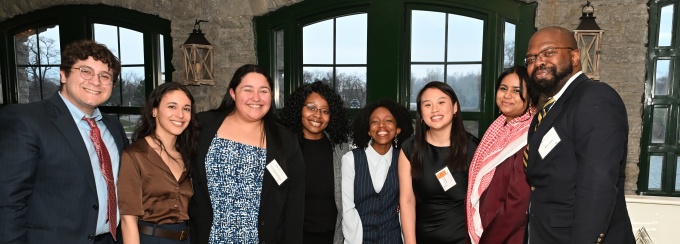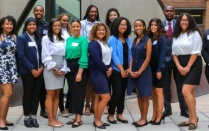
Our Commitment to Diversity and Inclusion
Our differences make us stronger. UB School of Law is committed to providing an environment reflective of our society's diversity where all students, staff, and faculty are empowered to excel. Through collaborative program development and curriculum integration, we will continue to expand pathways to legal education and ensure a welcoming and inclusive education experience that celebrates our unique identities.
The University at Buffalo School of Law is committed to providing an environment where students, staff, and faculty from underrepresented minority groups excel personally, academically, and professionally. The Office for Diversity, Equity, and Belonging seeks to continue to collaborate with the various School of Law Departments and community partners to provide a comprehensive approach to executing Diversity, Equity, and Belonging initiatives. Through program development, strategic planning, and community outreach, the Office for Diversity, Equity, and Belonging strives to continue to create an academic community comprised of a diverse group of professionals whose differences are valued as a source of strength in our law school community.
- Revamp Academic Programming and Student Success
- Increase Diversity Amongst our Student Body, Faculty, Staff and Administration
- Promote and Advocate for Diversity, Equity and Belonging
- Expand Support and Opportunities for Diversity, Equity and Belonging
Through programming and support, we work strategically to develop relationships with students from underrepresented and/or under-resourced backgrounds to continue to cultivate and maintain a diverse and inclusive law school environment.
Contact Us:
311 O'Brian Hall, North Campus
Buffalo, NY 14260-1100
716-645-7889
law-deb@buffalo.edu
To support our diversity, equity and inclusion initiatives, please consider making a gift to our Social Justice and Racial Equity Fund.
1. Recruit talented and diverse students, staff, and faculty.
3. Develop a culture of respect and awareness for diverse identities and cultures.
2. Provide support to retain diverse students, staff, and faculty.
4. Provide governance mechanisms through which diversity, equity, and inclusion concerns can be addressed.
5. Engage the community by providing opportunities for members of the Buffalo-Niagara community to engage with students from all backgrounds at the School of Law.
The University at Buffalo School of law is committed to ensuring equality of opportunity for students, faculty, and staff, without discrimination, or segregation on the basis of race, color, ethnicity, religion, national origin, gender, gender identity or expression, sexual orientation, age, disability, or military status.
The law school also abides by the University’s Discrimination and Harassment Policy, which states:
The University at Buffalo is committed to ensuring equal employment, educational opportunity, and equal access to services, programs, and activities without regard to an individual's race, color, national origin*, sex, religion, age, disability, gender, pregnancy, gender identity, gender expression, sexual orientation, predisposing genetic characteristics, marital status, familial status, veteran status, military status, domestic violence victim status, or criminal conviction status. Employees, students, applicants or other members of the University community (including but not limited to vendors, visitors, and guests) may not be subjected to harassment that is prohibited by law or treated adversely based upon a protected characteristic.
Both the law school and the University policies are in accordance with federal and state laws and regulations prohibiting discrimination and harassment. These laws include the Americans with Disabilities Act (ADA), Section 504 of the Rehabilitation Act of 1973, Title IX of the Education Amendments of 1972, Title VII of the Civil Rights Act of 1964 as Amended by the Equal Employment Opportunity Act of 1972, and the New York State Human Rights Law. These laws prohibit discrimination and harassment, including sexual harassment and sexual violence.
Inquiries regarding the application of Title IX and other laws, regulations and policies prohibiting discrimination may be directed to Sharon Nolan-Weiss, Director of the Office of Equity, Diversity and Inclusion and Title IX/ ADA Coordinator, 406 Capen Hall, Buffalo, New York 14260; Tel. (716) 645-2266; email diversity@buffalo.edu. Inquiries may also be directed to the United States Department of Education’s Office for Civil Rights, 32 Old Slip 26th Floor, New York, NY 10005-2500; Tel. (646) 428-3900; Email OCR.NewYork@ed.gov.
-----------
* Consistent with EEOC Guidance, “national origin” as used above includes both ethnicity and physical, linguistic, and cultural traits.
